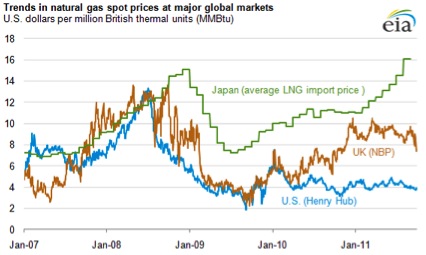Want to help the Ukrainian opposition? Allow natural gas exports.
The Russian government has shown itself quite willing to use its natural gas supplies as a political weapon

A free daily email with the biggest news stories of the day – and the best features from TheWeek.com
You are now subscribed
Your newsletter sign-up was successful
After weeks of effort, a growing protest movement in Ukraine appears to be gaining traction. As with a similar series of demonstrations in 2005, which brought former prime minister Viktor Yushchenko to power, the protest movement is centered on whether the country will look to Russia or to Europe and the West as a model.
Whatever the results of the current demonstrations, breaking free of Russian dominance over the long term may prove a challenge for Ukraine. The country remains dependent on Russian natural gas as an energy source, and the Russian government has shown itself quite willing to use this energy leverage as a political weapon. In fact, Russia recently announced a deal to bolster the current pro-Russian Ukrainian government by providing loans and cheaper natural gas.
Ukrainian President Viktor Yanukovich has signed off on the agreement, which would cut the price of Russian natural gas by 30 percent, but the country's protesters are not backing down. Opposition leader Oleg Taygnibok told The Los Angeles Times that the deal was "the price Moscow paid him for rejecting European integration," and the protests have continued unabated in Kiev.
The Week
Escape your echo chamber. Get the facts behind the news, plus analysis from multiple perspectives.

Sign up for The Week's Free Newsletters
From our morning news briefing to a weekly Good News Newsletter, get the best of The Week delivered directly to your inbox.
From our morning news briefing to a weekly Good News Newsletter, get the best of The Week delivered directly to your inbox.
Meanwhile, the United States is undergoing an unprecedented natural gas boom. Spurred by technological advances that have unlocked vast supplies of shale oil and gas, natural gas prices have fallen over the past five years from a high of over $12 per million British thermal units (BTUs) to $4 per million BTUs. According to the Energy Information Association, production is expected to increase an additional 56 percent by 2040.

Yet while prices have fallen in America, they remain high in Europe and Japan. Part of the reason for this disparity is a Bush administration-era regulation restricting the ability of companies to export natural gas. Under Executive Order (EO) 13337, companies wishing to build "facilities for the exportation or importation of petroleum, petroleum products, coal, or other fuels to or from a foreign country" must receive approval from the Department of Energy. Exceptions are made for countries that have a specific free trade agreement with the U.S.
This year the Obama Administration granted approval to four export facilities for liquefied natural gas. And Secretary of Energy Ernest Moniz recently suggested that a related ban on oil exports should be repealed. Nearly 20 projects, however, are still awaiting DOE approval.
Allowing more exportation of natural gas would be a boon for the U.S. economy. A recent report by the American Council for Capital Formation found that approval of pending export facilities would increase U.S. GDP by between $15.6 billion and $73.6 billion and create as many as 452,300 jobs by 2035. And by undercutting Russia's natural gas based market power, more gas exports would further America's national security interests as well.
A free daily email with the biggest news stories of the day – and the best features from TheWeek.com
Josiah Neeley is a Policy Analyst for the Armstrong Center for Energy and the Environment at the Texas Public Policy Foundation.